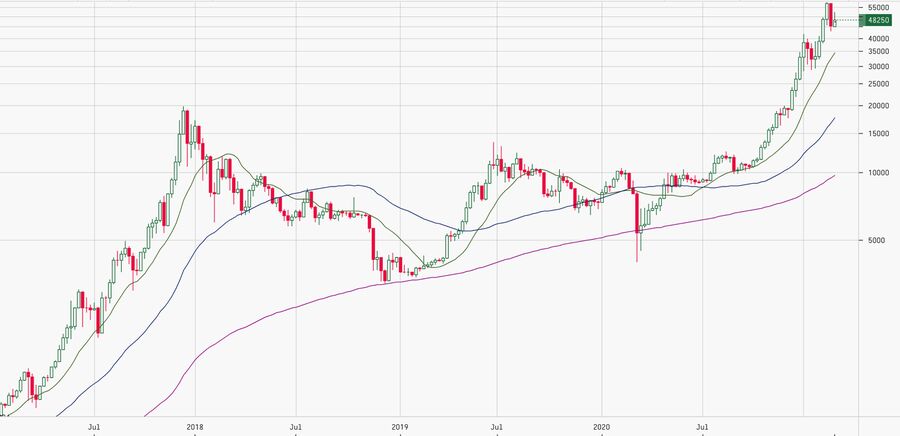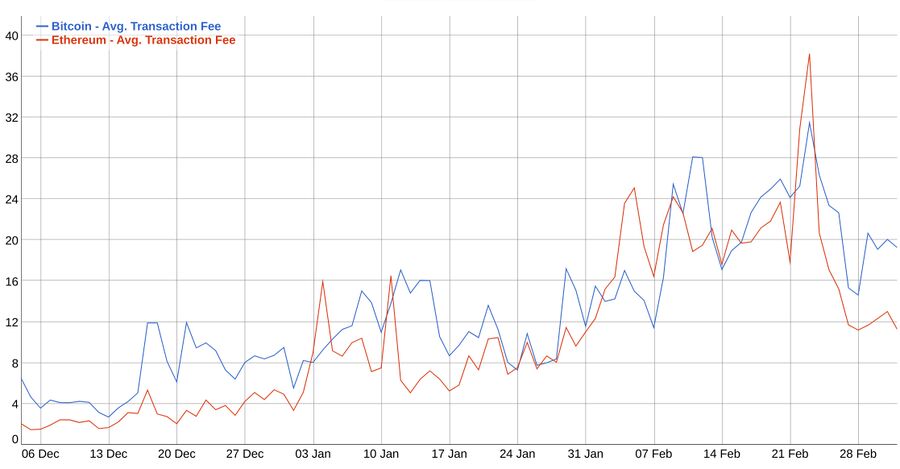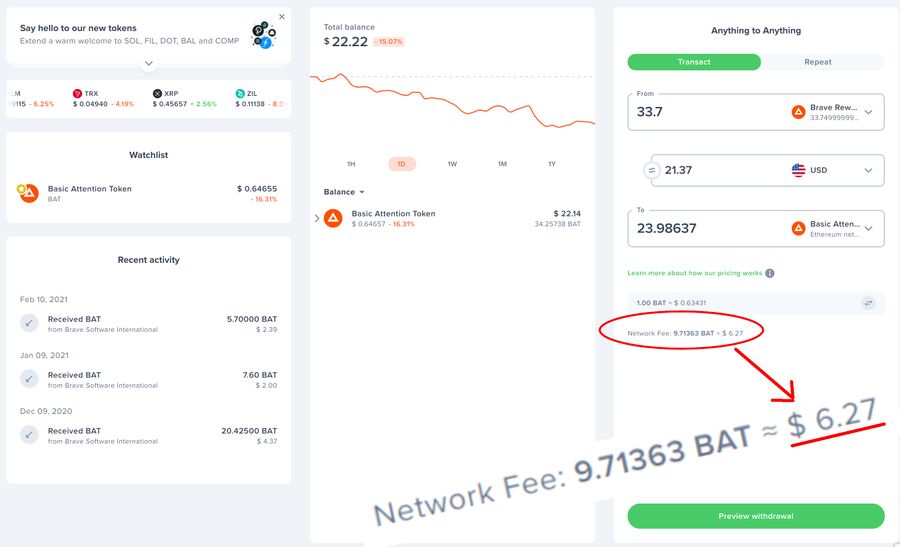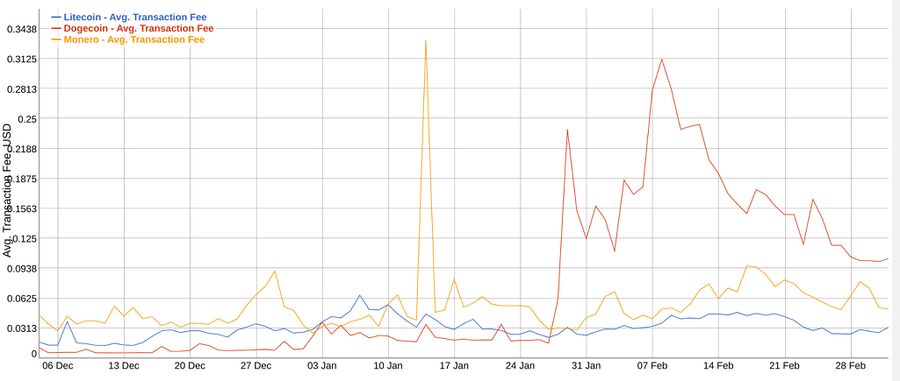Digital Currencies Like Bitcoin And Etherium And Tokens Based On Them Are Practically Useless As Of March 2021
Digital crypto-currencies, based on free open source software, promised banking for the poor and the unbanked, cheap and quick transactions, micro-transactions and a financial revolution. Several cryptocurrencies have great success as speculative instruments and stores of value, but that's it. All the bigger ones have become practically useless for just about everything else and so have all the smaller ones that don't have their own blockchain.
written by Öyvind Sæther 2021-03-06 - last edited 2021-03-06. © CC BY

The Bitcoin price from March 2018 to March 2021.
The Bitcoin (BTC) cryptocurrency had seen a seemingly endless rally last year following a dip to $4000 in March 2020. It ended 2020 just shy of $30.000. The really has continued in 2021 onto a current price around $48.000. That's a sweet 12x return for anyone who managed to buy the lowest low in 2020. It is hard to argue with Bitcoins success as a speculative financial instrument.
The Ethereum cryptocurrency is another example of a hugely successful financial instrument, it is currently trading just shy of $1500. That's 16x5 times higher than it's $90 low in March 2020.
The huge financial success and popularity of Bitcoin and Ethereum over the last year has resulted in one rather unfortunate side-effect: They have both become practically useless for most purposes. This affects other digital currencies as well, a whole lot of them are nothing more than "tokens" on the Ethereum blockchain.
$20 For A Single Payment Is Ridiculously Expensive[edit]

Bitcoin and Ethereum transaction fees between December 2020 and March 2021
A single Bitcoin transaction will currently cost you somewhere between 0.00024970 and 0.00059670 BTC. That works out anywhere from $12 to $29 for a single payment. The current Ethereum transaction fee is around $12 after a brief spike to $38 late February.
A European SEPA bank transfer is either completely free or very cheap. A VISA debit card will typically have a monthly fee around $3 and a zero per-transaction fee. Credit cards are mostly completely free as long as you pay your bill on time. They do become very expensive very quickly if you don't.
Sweden has a very popular and widely adopted bank-to-bank payment smartphone application called Swish. Using it is free. Having the application is free in some banks, others charge a $2-3 monthly fee.
It is very hard to call a $20 transaction fee competitive or even remotely attractive for someone who wants to send $100 worth to a friend. It is even more ludicrous to pay a $20 fee if you buy a $30 T-shirt in an online store. $20 would, on the other hand, be a small price to pay if you are buying a shiny new electric car from a rocket scientist.
28.5% Is A Lot For A Simple Withdrawal[edit]
The sole reason we even bother to bring the currently very high cryptocurrency fees up is that a handful of our very loyal readers who use the Brave Web Browser have graciously donated a total of 33.7 Basic Attention Tokens (BAT) over the last few months. Those tokens are currently worth around $0.66 a piece or $22 in total. BAT is a token on the Ethereum blockchain, it does not have any blockchain of its own. This means that it, like all the other currency tokens on the Ethereum blockchain, is subject to the high transaction fees Ethereums ETH currency has. Withdrawing the $22 our generous readers have donated would cost $6.27 or 9.71363 BAT. That works out to 28.5% or nearly one third of the amount.

Sending BAT currency from A to B will currently cost you around $6.27.
The "earn BAT currency by viewing advertisements so you can support the websites you love by tipping them with BAT currency" model Brave pioneered with the Brave Web Browser, in theory, quite interesting. It is a shame that the sharp rise in Etherium price and fees has pushed the cost of using those BAT tokens far beyond the point where such a system makes any sense at all. A $0.01 fee for tipping someone $5 or $10 would work. Braves tipping system is a joke as long as the BAT transaction fee is higher than $0.1 and it is just laughable with today's $6-ish transaction fees.
Some Cryptocurrencies Are Cheaper To Use.. For Now[edit]
The high transaction fees BTC, Ethereum and all Ethereum token have does not mean that all cryptocurrencies are utterly useless for practical day-to-day transactions. There are some cryptocurrencies that are cheaper to use because they are worth less (or worthless) and there are some that are cheaper to use because they were designed with a larger transaction capacity. The former will become useless if they rise in price and/or become popular among very rich people, the latter have a realistic potential of becoming a practical alternative to fiat currencies.

Average LTC, XMR and DOGE transaction fees between December 2020 and March 2021.
Litecoin (LTC), Monero (XMR) and Dogecoin (DOGE) are cryptocurrencies that currently have typical transaction fees in the $0.03-$0.1 range. Paying $0.6 per payment transaction is not all that unreasonable. One obvious question worth asking is: Are these "lower" (still somewhat high compared to the traditional banking system) fees a feature of those currencies or is it due to a lack of demand, interest and exchange rates?
The average price of a Monero transaction spiked up from $0.0398 on January 13th to $0.332, a 8.34x increase, on January 14th 2021. The average transaction fee fell to $0.048 the following day. It has remained in the $0.03-0.097 range since. There is no apparent spike in price or volume on any Monero exchange rate chart on January 14th so the transaction fee spike is a bit odd.
The average transaction fee chart for Dogecoin is a bit interesting. A DOGE transaction would cost between $0.011 and $0.018 up until the end of January 2021. A rocket scientist and car maker named Elon Musk begun accumulating DOGE late last year. He bought everything in a massive one-day candle pump that moved the DOGE exchange rate against the USD from $0.00742 to $0.0379 on January 28th and kept going until it topped at $0.086 the following day. DOGE is currently consolidating against the USD at around $0.052 per DOGE. The DOGE network transaction fees skyrocketed following the Elon Musk price-pump. The average DOGE transaction fee topped at $0.312 on February 8th before falling back to a steady $0.104. That is noteworthy because the current average transaction fee of $0.104 is 5-10 times higher than it was prior to the two-day Elon Musk pump. It is still nothing compared to the price of a Bitcoin or a Etherium transaction, but does show how the price of using a cryptocurrency can increase ten-fold overnight before leveling off in a range five times higher than the prior average.
The Future Of "Electronic Cash"[edit]
The Bitcoin whitepaper starts out with:
"Abstract. A purely peer-to-peer version of electronic cash would allow online payments to be sent directly from one party to another without going through a financial institution."
Electronic cash for every-day online payments may have been the vision, but it isn't what Bitcoin has become. It's not even remotely close. If I have a $100 bill and I hand you that $100 bill then I've paid a total of $0 in fees to give you that bill and you have the full $100 of value. If I send you $100 worth of BTC then I would currently have to pay around $20 in fees and you would only get $80 of usable value since you would have to pay another $20 in fees to spend it. That is simply not a usable form of electronic cash.
Bitcoin and Etherium are hugely successful as speculative financial instruments and they will probably remain successful in that area even though both are complete and utter failures for their intended purposes. Bitcoin is not a usable electronic cash payment system, and Etherium no longer a usable smart contract system. The latter has turned all the tokens and services that rely on the Etherium blockchain, like the Brave Web Browsers BAT currency, into practically useless jokes.
A digital electronic cash system based on free software, like Bitcoin was intended to be would be, would be a good thing. Perhaps some new or existing cryptocurrency will be able to become the standard way to do Internet payments and payments in general. Perhaps Monero has a chance of becoming the Internet currency, perhaps not, it depends on how well it scales. No cryptocurrency will see truly broad adoption unless it can handle millions of daily transactions at a per-transaction cost well below $0.1, less if it were to handle micro-transactions.
There are probably lots of people who would happily donate $1 or $5 to a site like this if there was a easy and near-free way to do it. Small transactions like that would probably a lot more common if the transaction price of a small donation was $0.01.



Enable comment auto-refresher